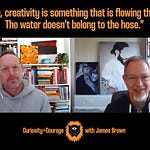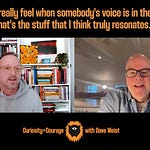[Listen to the interview above, or via Apple, Spotify, or YouTube. And if you’re enjoying these conversations, please share a link with someone else.]
I first met Paisley in Boston back in the early 2000s when she was a writer on the Volkswagen business at Arnold Worldwide. This was the early Internet, the era of storytelling through banner ads. We were transforming the idea of advertising for a digital age. Since then she’s moved back to San Francisco, her birthplace, and made a career in strategy, branding and naming. And joy.
“People can feel it on the other end. If you have joy, if you have passion in your work, if you fall in love with your project, they feel it and they can fall in love with it, too.” - Paisley Schade
In our conversation, Paisley provides a wise distinction between the efforts of advertising and the effort of branding. They’re too often considered the same. For Paisley, there’s the issue of time.
“I think it’s about the view—how far ahead you’re looking. With advertising and social media especially, if there’s something hot, you need to address it immediately, like within hours. You need to be aware of where culture is going. [Brand is different.] You’re trying to create something that’s going to last at least ten years. So you have to look out like what’s the deeper or farther perspective? Trying to predict how society will feel ten years from now is hard to do.” - Paisley Schade
And then there’s the difference in output. What is meant to be seen, versus what has meaning but isn’t always visualized or published.
“The thing about advertising is you see your work in the world. With branding, I may have done the whole strategy behind the company, the voice and the messaging—but I won’t see my words in the world.” - Paisley Schade
We spoke at length about AI. As a writer, she’s very resistant to giving up the responsibility of her words to an algorithm. And she’s amused when AI companies hire her to help define and advertise their AI platforms. But she offers a poignant insight about taking notes in a meeting, and listening.
“I was talking to somebody and they were like, ‘Oh, I use AI to take notes in a meeting.’ And I said, why would you do that? My notes don’t look like the minutes of the meeting. I don’t write down what people say. I write down what I experience. I’m reading their facial expressions and watching them. And those are not the same thing. An AI is just going to spit out what it heard. And that’s not good enough for me.” - Paisley Schade
We had a robust, wide-ranging conversation. I hope you enjoy it.
Thanks for reading and listening. This is the final podcast episode of 2024. I’ve got edits in the works and interviews lined up for a slew of intriguing interviews starting in January. Please help me build the audience and share this episode with one other person.
Episode notes
Paisley mentions the song Wriggle by the artist Cosmo Sheldrake.
You can find Paisley on her website, or via LinkedIn.












Share this post